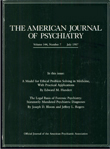Clinical implications of adult developmental theory
Abstract
Multidisciplinary studies of adulthood have revolutionized thinking about developmental processes during the second half of life. These ideas are just beginning to be integrated with clinical theory and practice. The elaboration of the interface between the rapidly expanding developmental theory of normal adulthood and clinical intervention with older patients is a psychiatric frontier. Illustrating with clinical examples, the authors offer a rationale for using new diagnostic tools, suggest a revision of the theory of transference to include sources beyond childhood, and describe unique transference paradigms in older patients as well as equally phase- specific countertransference responses in their therapists.
Access content
To read the fulltext, please use one of the options below to sign in or purchase access.- Personal login
- Institutional Login
- Sign in via OpenAthens
- Register for access
-
Please login/register if you wish to pair your device and check access availability.
Not a subscriber?
PsychiatryOnline subscription options offer access to the DSM-5 library, books, journals, CME, and patient resources. This all-in-one virtual library provides psychiatrists and mental health professionals with key resources for diagnosis, treatment, research, and professional development.
Need more help? PsychiatryOnline Customer Service may be reached by emailing [email protected] or by calling 800-368-5777 (in the U.S.) or 703-907-7322 (outside the U.S.).



